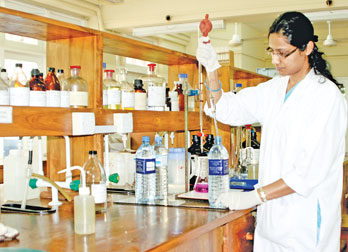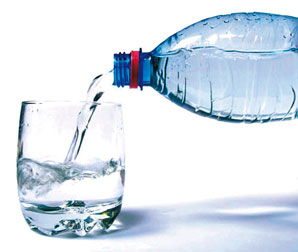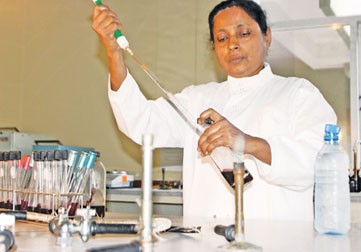How safe is bottled water?
By Manjula FERNANDO
 |
|
Testing at the SLSI
chemical laboratory |
Is 'bottled water' safer for consumption than pipe borne water?
We need answers to this question, especially since our daily routines
force us, the town-dwellers, to quench our thirst with gallons of water
which come in plastic bottles.
Available in most boutiques and supermarkets in Sri Lanka, plastic
water bottles come in various forms, shapes and brand names. They are
described as 'bottled drinking water', 'mineral water' or 'spring
water'.
But in our daily routine, there is hardly any time to look around for
proof of their safety. More often than not, we hardly pause for a moment
to have a look at the label.
The label can say a lot, experts say. For instance, consumers must
ensure that the label has a Health Ministry registration number, date of
manufacture and expiry, the source (water) of the product and a standard
certification, for instance the SLS mark.
The SLS mark or any other standard certification guarantees that the
product has been tested over and over again for its safety and quality
standards. There is regular monitoring for re-registration. This ensures
that the liquid that enters your system would not ultimately make you
sick.
According to health officials, the process of obtaining authorisation
to package and sell drinking water is stringent in Sri Lanka.
The Health Ministry is the sole authority that can permit a new water
bottling plant. Without their licence, a new brand of bottled water
cannot reach our market shelves. this applies to imported brands as
well. The process to obtain the licence is quite stringent.
Nevertheless, the Food Unit of the Health Ministry warns consumers to
be vigilant. As with all other products, there can be room for
impurities to invade the market.

| Complaints should be made to - The local Medical Officer of Health
(MOH) with a copy to the Food Control Administration Unit (next to Blood
Bank, Narahenpita)
Bottled drinking water- involves a purification or treatment process
after it is extracted from the source. The water taken from the source
may not necessarily be pure.
Natural mineral water - Except for some form of filtering, no
purification is done. The water is natural. The bottling plant has to be
near the source. The licensing process for natural mineral water is very
stringent because the Chief Food Authority needs to be convinced that
this water is from a good source. There is only one natural mineral
water brand in Sri Lanka at present.
Boiled water - The most foolproof method of making drinking water
safe is by boiling. Bringing the water to the boiling point of 100
degrees Celsius will kill most of the pathogenic organisms in water that
could make you ill. There is no need to boil it for 10 minutes, you will
only be wasting fuel. |
"We cannot keep a tab on all the products sold everywhere. The
consumer's share of responsibility is very valuable in this instance,"
Dr. C. K. Shanmugarajah, former Director Environmental, Occupational and
Food Safety Unit of the Health Ministry who now functions as a
consultant at the Food Control Administration Unit (FCAU) said.
"Generally, the bottled water products in Sri Lanka conform to safety
regulations," he added saying that the MOH in the area or the FCAU of
the Health Ministry (which is next to the Blood Bank, Narahenpita) can
be notified of any suspected brands in the market.
"We will subject it to a lab test and remove the product from the
market if it is found to be unfit for human consumption,” he said.
The Unit had confiscated a stock of bottled water sold near the
Cancer Hospital in the recent past. A complainant who contacted the Food
Control Administration Unit said the particular brand did not carry the
Health Ministry registration number, and the entire stock was removed
from the shelves.
Thriving business
There were nearly 300 brands of bottled water in the market in
mid-2000. "It was a thriving business then. That was when we thought
this area needs to be regulated," Dr. Shanmugarajah said. The Health
Ministry introduced regulations under the Food Act of 1980 to protect
the rights of consumers. The regulations were made effective in May
2006.
Thus, it was prohibited to bottle, package, import or distribute
mineral or drinking water without obtaining a certificate of
registration from the Chief Food Authority of the Health Ministry.
The standard certification from the Sri Lanka Standards Institution
(SLS) however, is not compulsory, but if the SLS or any other
certification is printed, it means the product has undergone strict and
regular monitoring to ensure its purity.
The Chief Food Authority has permitted 120 brands of bottled water to
be sold in the country. However, there are only 116 brands of bottled
water in the market.
Three factories are now out of business and the licence of one
factory was cancelled due to the presence of e-coli bacteria found in
human excreta, in their product. There are 25 new applications awaiting
approval. When a new water bottling plant needs registration, the
applicant should submit samples of the water from the particular source
and a hydro geological survey report by a qualified engineer as to how
much water can be extracted from the particular source without harm to
the environment among other things.
It would be a preliminary screening to evaluate the premises and the
individual's capacity to continue the plant. Then the samples would be
submitted for laboratory testing.
"We have a memorandum of understanding with the SLSI for evaluation.
The SLSI makes a recommendation to the Chief Food Authority in six to
nine months. They will evaluate whether the source is satisfactory, the
processing plant up to standard, and whether the periphery satisfies the
hygienic conditions,” he said.
Samples collected
Two samples are then collected from the source in addition to the
already packaged samples. the SLSI reports on a pre-defined checklist.
then they recommend the granting of the approval. There are no specific
tests carried out on the bottle, but packaged samples are tested to
determine if the plastic bottle contains any harmful material to the
consumers.
 |
|
Testing at the
microbiology laboratory |
"Initially, the permit would be effective for three years and then
the manufacturer should apply for re-registration where the whole
process would be repeated. This will give us time to re-evaluate if the
source or the product has been altered in any way," Dr. Shanmugarajah
said.
The Health Ministry has not conducted any market surveys to test the
bottled water on the shelves since 2008. They earlier mobilised PHIs on
a particular day to collect samples from each brand and subject it to
laboratory testing. The tests conducted earlier, however, did not find
any blemished samples.
"This shows that we had a very good system of licensing in place. But
these random checks have not been carried out since 2008," he pointed
out.
"Boiled and cooled water is very safe and you are also assured of its
safety. This is best for consumption in the domestic front. Pipe-borne
water, if boiled and cooled, can be deemed the safest for consumption,"
Dr. Shamugarajah explained. He said he would not recommend the direct
consumption of pipe-borne water. Although it is purified before being
released, there could be contamination in between.
Bottled water may be a convenient source, but the habit of drinking
boiled, cooled water at home should never be discouraged.
Chairman SLSI Kanchana Ratwatte, Deputy Director General Dr.
Priyadarshani Talgaswatte and laboratory officials of the SLSI provided
assistance and information for this article.
|

